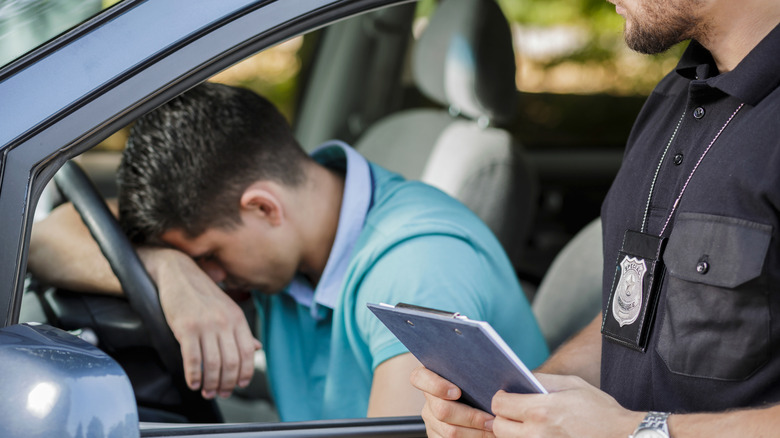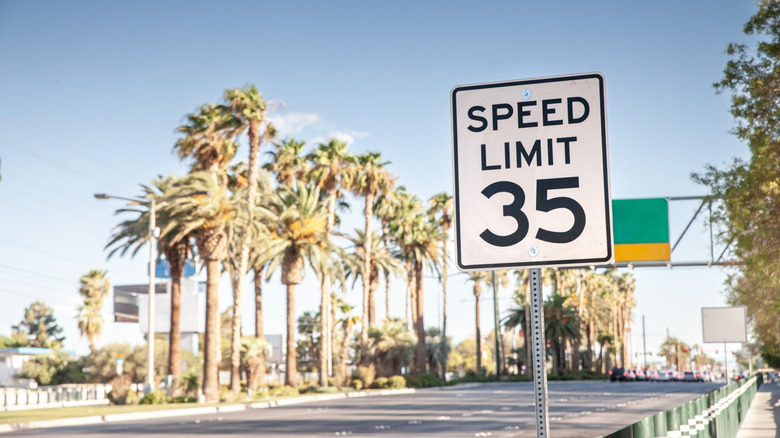Beware Drivers: Speeding In Nevada May Bring A Very Expensive Coverage Cost
Speeding is the most common traffic citation in the US, with 24.6% of all traffic tickets being issued to those of the population with a leaden right foot. On the face of it, if you're pulled over for speeding, the ramifications aren't too bad. In Nevada, for instance, the penalties range from $100 and one penalty point for being 5 mph over the speed limit to $420 and four points for being 21 mph over the limit. Not that we're saying that these are trivial numbers, but they're not the biggest cost errant drivers face.
The real expense arrives later in the form of increased insurance rates. The bad news for Nevada drivers (at least speeding ones) is that the state has the third-largest insurance rate increase for speeding drivers in the US. For a driver who is booked doing between 11 and 15 mph over the limit, the standard penalty is $200 and two penalty points. However, according to a study undertaken by LendingTree, the average auto-insurance premium jumps from $2,789.85 to $3,663.39, a rise of 31.3%.
When compared to the national average of 22.7%, Nevada is one of the most expensive states when it comes to coverage costs after a speeding violation. It's topped only by California — car insurance in California is not cheap anyway — and Michigan, with rate increases of 42% and 35.8%, respectively.
How speeding offences affect insurance premiums
The insurance figures quoted in the study are based on full coverage policies for a 30-year-old male driver with no previous driving offences and driving a 2018 Honda CR-V. However, for younger drivers caught speeding, the story is even bleaker. While the insurance premium percentage increase is similar across age groups, the greater initial premiums paid by younger drivers set a higher starting bar. For instance, a driver in their sixties pays an average insurance premium of $1,783.08 and faces an average "speeding ticket" raise of 30.7% — equating to an insurance increase of $548.09. For comparison, a 20-year-old driver can expect to see a coverage hike of 28.9% but when applied to the average base premium of $4,092.50, the increase is a whopping $1,183.67.
Ultimately, insurers care about one thing — crash risk. As insurance agent Rob Bhatt explained to LendingTree, "In the eyes of an insurance company, drivers with a speeding ticket are more likely to get into accidents than those with a clean driving record." For Nevada drivers, this risk-based approach translates into some of the steepest post-speeding ticket increases in the country. One of the reasons that the jump feels so severe is that the state's baseline premiums are already higher than the national average. Nevada ranks as the fourth most expensive state for car insurance, with the average annual full-coverage car insurance costing $3,549 — or about 5% of the average person's income. With an average speeding ticket adding $702, this rises to $4,251.
What can you do if you're caught red-footed?
Speeding is a very common offense; annually, over 40 million Americans are issued a speeding ticket, or about 78 drivers a minute. Statistically, the average driver faces a 17% chance of receiving a ticket for any offense, and roughly a quarter of these are for speeding. It therefore equates to about 4% of drivers being charged with speeding annually. So, what can you do if you're one of the one-in-twenty-five drivers facing increased insurance bills because of a speeding offense?
One option that could help is to take advantage of a diversion program that many states run. For instance, in Nevada, you can have a maximum of three points removed by attending an approved Traffic Safety School. Of course, shopping around for the cheapest car insurance is also an option. This is especially relevant, as speeding offenses don't normally affect insurance premiums until a policy needs to be renewed. This time can be spent researching and comparing quotes to see if a better deal is available (not all insurers apply the same penalties).
Finally, avoid future convictions. For insurance purposes, convictions are considered when calculating premiums for three to five years after the offense. This means that as long as you keep within the speed limit, your insurance costs will eventually normalize. On the flip side, multiple speeding tickets can make things significantly worse, with premiums climbing far beyond the state's post-ticket average. One other possible consideration is an app that could prevent you from getting a speeding ticket.


